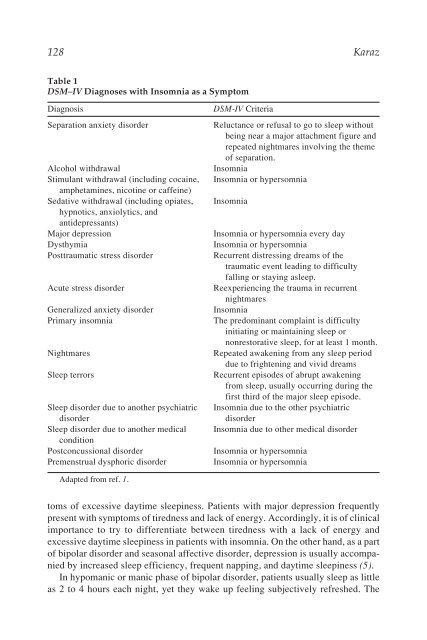Insomnia Insomnia
Insomnia Insomnia
Insomnia Insomnia
You also want an ePaper? Increase the reach of your titles
YUMPU automatically turns print PDFs into web optimized ePapers that Google loves.
128 Karaz<br />
Table 1<br />
DSM–IV Diagnoses with <strong>Insomnia</strong> as a Symptom<br />
Diagnosis DSM-IV Criteria<br />
Separation anxiety disorder Reluctance or refusal to go to sleep without<br />
being near a major attachment figure and<br />
repeated nightmares involving the theme<br />
of separation.<br />
Alcohol withdrawal <strong>Insomnia</strong><br />
Stimulant withdrawal (including cocaine, <strong>Insomnia</strong> or hypersomnia<br />
amphetamines, nicotine or caffeine)<br />
Sedative withdrawal (including opiates, <strong>Insomnia</strong><br />
hypnotics, anxiolytics, and<br />
antidepressants)<br />
Major depression <strong>Insomnia</strong> or hypersomnia every day<br />
Dysthymia <strong>Insomnia</strong> or hypersomnia<br />
Posttraumatic stress disorder Recurrent distressing dreams of the<br />
traumatic event leading to difficulty<br />
falling or staying asleep.<br />
Acute stress disorder Reexperiencing the trauma in recurrent<br />
nightmares<br />
Generalized anxiety disorder <strong>Insomnia</strong><br />
Primary insomnia The predominant complaint is difficulty<br />
initiating or maintaining sleep or<br />
nonrestorative sleep, for at least 1 month.<br />
Nightmares Repeated awakening from any sleep period<br />
due to frightening and vivid dreams<br />
Sleep terrors Recurrent episodes of abrupt awakening<br />
from sleep, usually occurring during the<br />
first third of the major sleep episode.<br />
Sleep disorder due to another psychiatric <strong>Insomnia</strong> due to the other psychiatric<br />
disorder disorder<br />
Sleep disorder due to another medical <strong>Insomnia</strong> due to other medical disorder<br />
condition<br />
Postconcussional disorder <strong>Insomnia</strong> or hypersomnia<br />
Premenstrual dysphoric disorder <strong>Insomnia</strong> or hypersomnia<br />
Adapted from ref. 1.<br />
toms of excessive daytime sleepiness. Patients with major depression frequently<br />
present with symptoms of tiredness and lack of energy. Accordingly, it is of clinical<br />
importance to try to differentiate between tiredness with a lack of energy and<br />
excessive daytime sleepiness in patients with insomnia. On the other hand, as a part<br />
of bipolar disorder and seasonal affective disorder, depression is usually accompanied<br />
by increased sleep efficiency, frequent napping, and daytime sleepiness (5).<br />
In hypomanic or manic phase of bipolar disorder, patients usually sleep as little<br />
as 2 to 4 hours each night, yet they wake up feeling subjectively refreshed. The


